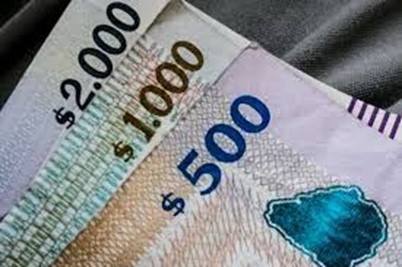The increase in prices in the Uruguayan economy is the main factor that explains the sharp deterioration in consumer confidence during the month of March, which had its largest contraction since the pandemic broke out, according to the report by the Chair of Economic Confidence of the Catholic University and Consulting Teams.
The economic situation is the main concern of Uruguayans
All the components of the indicator showed decreases, highlighting the worse perception of the Economic Situation of the Country that falls in its two components (situation at one and three years). This would show that the population is concerned both about the current economy and about the recovery in the medium term.
The Consumer Confidence Index (CCI) had a significant drop in March of 5.3 points, which implies the largest contraction of the indicator since the shock caused by the outbreak of the pandemic in March 2020. In this way, with a With a score of 45.8, the index leaves the zone of moderate optimism (more than 50 points) in which it remained for five months and is situated in the zone of moderate pessimism (between 40 and 50 points). Measured in year-on-year terms compared to March of last year, the ICC registers an increase of 0.4 points, while if the annual average is considered, the index is 1.9 points higher. The deterioration in consumer confidence is explained by the drop in the three sub-indices that comprise it. According to the report, “this is consistent with the data from the public opinion survey carried out by Equipos Consultores released on April 13, on the main issue of concern for Uruguayans, where the economic situation is presented as the main problem, then of two years where the pandemic had occupied the first place ”. In particular, it is estimated that one of the issues that may have had the greatest impact on the perception of the surveyed public is inflation, which stood at 9.4% in the moving year ending March.
The government response
The president, Luis Lacalle Pou, assured that the greatest current concern of the coalition government is “that the Uruguayans do not lose purchasing power.” The measures taken, which include both a 3% increase in pensions and pensions and a 2% increase in the salary of public officials, as well as a call for tripartite negotiation so that private companies advance adjustments for inflation in their branch, arose from a series of “juncture” agreements. “As a result of the conflict that is taking place in the world, the war (between Russia and Ukraine), inflationary pressure has been suffered (…), inflation has risen throughout the world,” said Lacalle Pou, who stressed that if well in such a crazy world it is difficult to predict what will happen, with this rise wages would be above the expected annual inflation. Lacalle Pou, who met with the leaders of the parties that make up his government, former president Julio María Sanguinetti for the Colorado Party, senator Guido Manini Ríos for Cabildo Abierto, deputy Daniel Peña for the People’s Party and also minister of Labor, Pablo Mieres, for the Independent Party, said these measures were seen as “the best possible.” “Among the given increases (…) we are above 9%, which in principle in this changing world would be above expected inflation. It seems to us that this tool is the one that ensures us to put more money in the pockets of Uruguayans », he emphasized.
Regarding new deductions to the Value Added Tax (VAT) in food products, the president affirmed that they are not foreseen, although he was right that it will be evaluated to extend the already arranged weeks ago to the strip roast, baked goods and other basic foods. The president evaluated as a positive sign that the recovery from the greatest impact caused by the covid-19 pandemic has been reflected in a recovery of labor sources and “economic growth reflected basically in exports, in industrial production and some other activities”.
He was also consulted about the increase in poverty rates, an aspect on which he acknowledged that there was a situation of “weakness” that affected thousands of citizens but clarified that the government made a “very great assistance” effort aimed especially at the sectors more vulnerable.
The region
The evolution of consumer confidence in other countries in the region also showed sharp falls and the four countries analyzed registered a worse performance compared to February. Despite falling to the zone of moderate pessimism, Uruguay was the best placed country, since Argentina, Brazil and Chile continue to be positioned at the level of reasonable pessimism (less than 40 points). Brazil had the smallest decline (-0.5 points), allowing it to climb to second place in the series after Uruguay. Argentina fell 2.5 points, obtaining the worst score in the last nine months and placing itself in third place in the series. Chile falls for the second consecutive month, decreasing 0.8 points in March, remaining within the reasonable pessimism zone (less than 40 points) and occupying the last place in the series.
Clearly, the global situation has an impact, the world is convulsed with the war in Europe and the consequences that this entails, obviously Uruguay is not an island, and the impact of consumer prices is noticeable, regardless of this, the government’s response does not seem be the most effective or at least not enough due to the adjustments that were proposed to alleviate this situation that clearly fall short. We will have to wait for the evolution of this situation, but the horizon does not look very encouraging.
Juan Prandi







